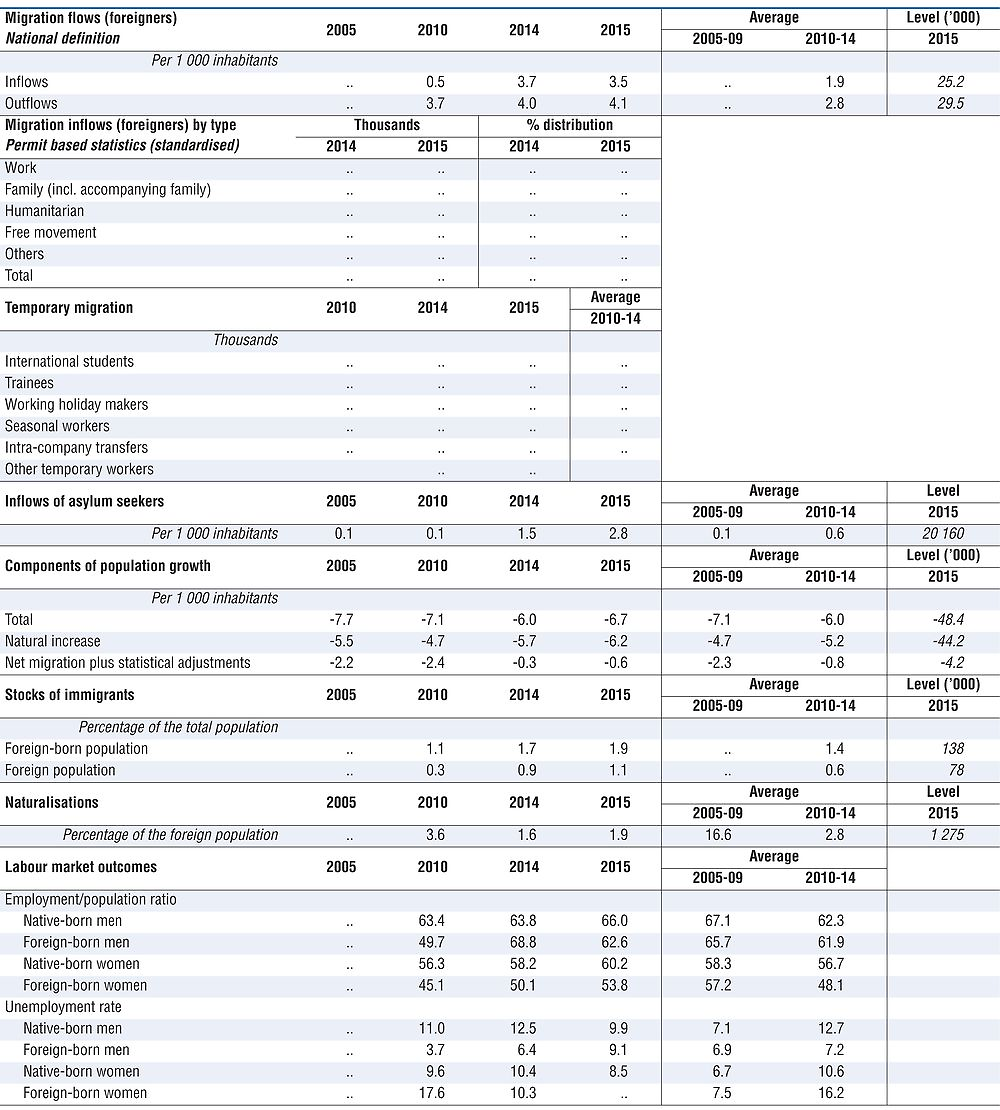Bulgaria
In 2015, as in previous years, registered net migration was negative (-4 200 persons). The difference between net migration of Bulgarians (-13 700) and of foreigners (+9 500) widened in 2015, contributing to a further decrease of the population. Registered changes in permanent residence may underestimate migration flows.
Following past trends, emigration of Bulgarians continued to increase and reached 24 500 in 2015. Around 60% of emigrants are aged between 30 and 50 and are labour migrants of short and medium duration. Students also represent a significant share of those leaving the country.
Immigration (of both nationals and foreign born) started decreasing in 2015 after the pick-up registered in 2014. This trend is driven by the declining immigration of foreigners (-15%), mainly Syrians; in contrast return migrants registered an increase (+12%) compared to 2014.
The number of foreigners entering the country in 2015 was 14 500, almost all from non-EU countries. The top three nationalities were Syria (asylum seekers), Russia and Turkey (mainly students).
The stock of foreign-born persons residing in Bulgaria increased by 10% in 2015 and reached 137 800 people, corresponding to 1.9% of the total population. In the last few years, the foreign-born population in Bulgaria has increased with immigration from both countries with similar cultural and economic characteristics and from other EU countries following Bulgaria’s EU accession. Third country nationals are represented mainly by those born in the Russian Federation (18.9% of the total foreign-born population), Syria (8.6%), Turkey (7%) and Ukraine (5.6%). Among EU countries, the United Kingdom, Greece and Germany are the main countries of origin as well as the main countries of destination for Bulgarian emigrants.
The weak labour market situation is likely to be the main factor explaining the decrease in the number of workers coming from abroad. In 2015, around 200 new work permits were issued, the lowest number since the beginning of the 2000s; around 290 work permits were renewed. The overall number of work permits decreased by 15.5%.
In 2015 most of the work permits were granted to US citizens (73), mainly professors, followed by workers – mostly technical staff – from the Former Yugoslav Republic of Macedonia, Serbia and Turkey. In addition, 71 people from Turkey, Japan and India came as short-term workers not requiring work permits. In addition to these work permits, EU Blue Card issuance increased significantly (116 in 2015 vs. 31 in 2014). The main countries of origin of Blue Card recipients include Ukraine, the Russian Federation, the United States, India, and the Former Yugoslav Republic of Macedonia.
The number of foreign students enrolled in the academic year 2015/16 was 11 616 (4.4% of the total). Nearly 80% of them came from the neighbouring countries and main nationalities include Greece (27%), Turkey (21%), the United Kingdom (8%), and Germany (6%). Students with Bulgarian origin living abroad are encouraged to study in Bulgaria and the State subsidises their university education.
Applications for international protection rose in the last few years, but fell in 2016, when Bulgaria received 18 990 applications (-5.8%). Of these, 764 people received refugee status and 587 subsidiary protection. Nearly 90% of total applications were from three nationalities: Afghanistan, Iraq and Syria. Since the beginning of 2015 the number of Syrian asylum seekers has decreased, due to reinforced border control, although the number of applicants from Afghanistan and Iraq increased.
In order to align Bulgarian legislation with EU free mobility, in May 2016 the Labour Migration and Labour Mobility Act was adopted. It aims to ensure equal treatment of employees regardless of their citizenship and to provide stronger protection of Bulgarian citizens who work outside the European Union. Another change relates to seasonal workers who work up to 90 days, who are entitled to receive a special visa and a permit from the Ministry of Labour and Social Policy.
In June 2016 a proposal for an amendment in the Law for Foreigners was adopted on the first reading by the Parliament. It envisages a dramatic reduction (six-fold) in the price of purchased property required for the issuance of a long-term residence permit. After five years of residence in the country, the real-estate investor becomes eligible for a permanent residence permit. Another recent amendment to this law is tightening the process of issuing long-term visas for foreigners without citizenship.
The number of persons arrested at the Bulgarian border for illegal entry increased dramatically after 2013 and was around 29 000 in the first nine months of 2016. The border surveillance between Turkey and Bulgaria was further strengthened and additional EU technical and financial support was approved in December 2016.

